2013年考研《英语》考前押密试卷(三)
-
The chart below shows the changes of consumer index in a certain country from 1930 to 1980. Study the chart carefully and write an essay of 160-200 words to
1 ) describe the trend of consumption as revealed in the chart,
2 ) explain the possible reason underlining this trend, and
3) give your comment.
You should write neatly on Answer Sheet 2. (20 points)
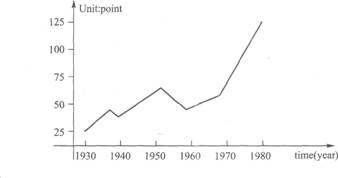
-
__________
-
Zhang Li is a classmate of yours. He suffered from a serious illness. Write a letter to
1 ) call on the students to help Zhang Li and
2 ) tell them how to help Zhang Li.
You should write about 100 words on ANSWER SHEET 2. Do not sign your own name at the end of the letter. Use "Li Ming" instead. You don' t have to write the address. ( 10 points)
-
__________
-
__________
-
__________
-
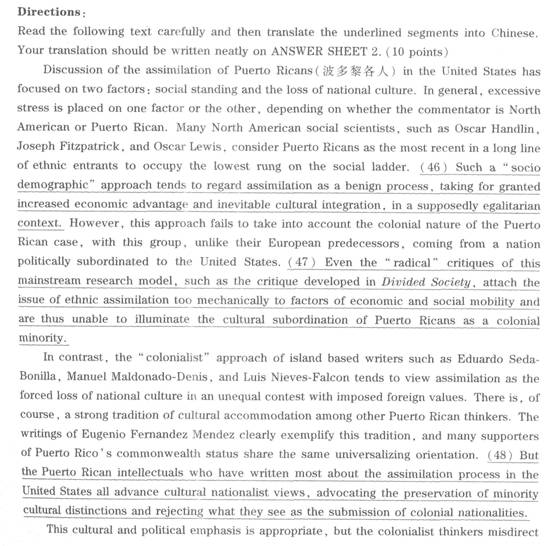
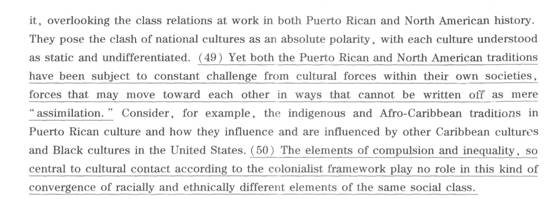
根据以上内容,回答1~5题。
__________
-
__________
-
__________
-
__________
-
__________
-
It c
- an
- be inferred from the text that [A] the effe
- ct of a well
- designed graph might be very small. [B] the new pyramid is definitely doomed to be a failure. [C] political influence will never be waved from the design. [D] the Potato Board of the
-
Directions :
The following paragraphs are given in a wrong order. For Questions 41-45, you are required to reorganize these paragraphs into a coherent text by choosing from the list A-G to fill in each numbered box. The first and the last paragraphs have been placed for you in Boxes. Mark your answers on ANSWER SHEET 1. (10 points)
[A] As a science, management entails the use of organized knowledge. Many of the things managers do are a result of information obtained through formal research and study.
One area in which a great deal has been done is quantitative decision making or, as it is known today, management science. We know that by using certain mathematical formulas we can control inventory and project demand more accurately than by merely using trial and error.
[B] Management is the process of getting things done through people. We know that part of this process is carried out with the development of an organization structure.
[C] Yet management is also an art. Through experience the manager develops judgment and intuition, subjective factors that are useful in evaluation situations. For example, the manager may have to choose between two strategies, A and B. All research and study may indicate that neither of the two is any better than the other.
[D] Effective management is a combination of art and science. Neither should be ignored; neither ought to be relied on exclusively. In getting things done through people, management must seek the right blend of art and science. At the upper levels of the hierarchy there will be more emphasis on the former; at the lower levels there will be more emphasis on the latter.
[E] How do managers succeed in getting things done through people? In order to answer this question it is necessary to break down the manager' s job into its basic duties or functions. Management entails planning, organizing, directing, and. controlling. By performing well in each of these areas the manager can get things done through people.
[ F] However, what if the manager chooses strategy A on the basis of intuition and proves to be right? In this case it is difficult to say precisely why the manager was able to choose so well, but there must be some special ability he or she has. This same type of ability is useful in managing people. Effective managers know when to flatter their subordinates and when to be stern. Such human behavior. skills cannot be quantified; they can only be learned through experience and training.
[ G ] However, there is more to management than just organizing the people and the work. objectives must be set, plans formulated, people directed, and operations controlled.
In making the necessary decisions, management must rely on all the skills at its command.
As a result, management is both a science and an art.

根据以上内容,回答1~5题。
__________
-
The biggest problem with the new pyr
- amid seems to
- be that [A] it fails to identify the proper proportion of different food groups. [B] it fails to distinguish between a hamburger and a
- chicken breast. [C] it involves too much on-line work to benefit those who nee
- d it. [D] it involves unlabelled, multi-colored strips out of a cartoon jumble.
-
Which of the following is NOT TRUE
- about the Food Guide Pyramid in 1992? [A] It stresses the value of grains, vegeta
- bles and fruits. [B] It pla
- ces emphasis on the four basic foo
- d groups. [C] It rejects higher proportion of meat, sweets and oils. [D] It met objections frommeat and dairy industries.
-
The phr
- ase" caved in" ( paragraph 2) most pro
- bably means [A] yielded. [B] entered. [
- C] promise
- d. [D] criticized.
-
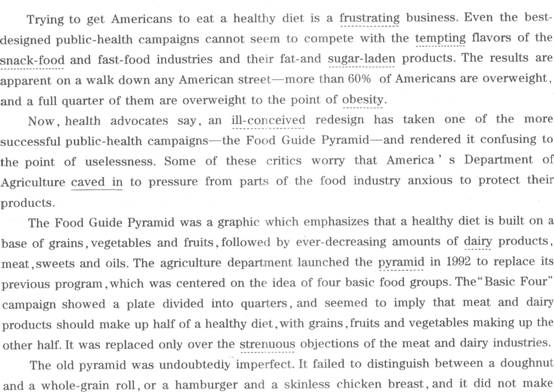
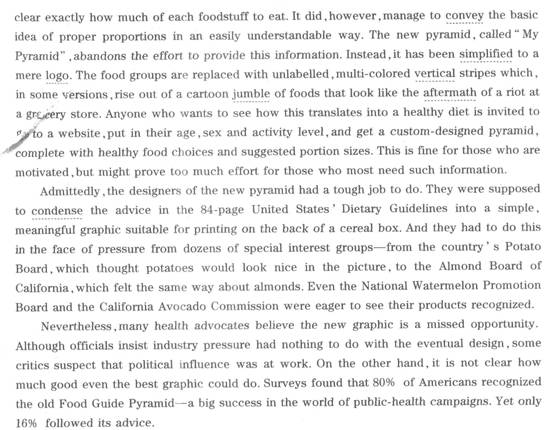
根据以上内容,回答16~20题。
"Trying to get Americans to eat a healthy diet is a frustrating business" can be easily proved by the fact that
[A] public-health campaigns cannot compete with tempting flavors.
[B] snack-food and fast-food industries are flourishing in the US.
[C] most food in America are profoundly rich in fat and sugar.
[D] fat people account for a large proportion of American population.
-
The
- author' s attitude towards this idea of
- burying pollution seems to be [A] obje
- ctive. [B] in
- different. [C] confused. [D] critical.
-
Which of the following is NOT mentioned
- as a disadvantage of
- burying pollution? [A] It a
- ctually prevents companies from looking for other energy sources. [B] It is
- difficult to make sure that the buried gas will stay where they are. [C] It might turn up with serious consequences in the years to come. [D] It will possibly take up too much room in the earth to be sustai
-
The best title for this p
- assage might
- be [A] How to Deal with Air Pollution. [B] Ways to Maintain a
- Clean Atmosphere. [C] Argument over Burying Pollution. [
- D] Environmentally Minded Oil Companies.
-
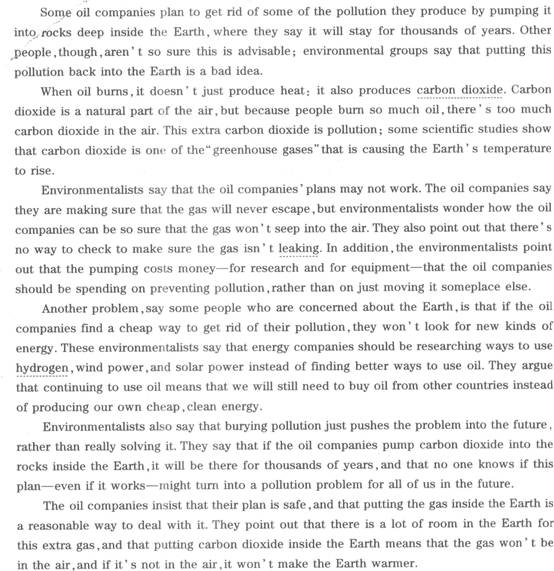
根据以上内容,回答11~15题。
- According to the passage, oil results in air pollution because [A] it burns very easily and has a very awful smell. [B] it produces too much heat that warm up the temperature. [C] it e
-
According to some environment
- alist, the oil companies&n
- bsp; [A] are further polluting the air by using more oil than
- clean energy. [B] are not really concerne
- d with solving the problem of pollution. [C] are attempting to reduce the pollution they have done to the air. [D] are in need of research and equipment in pollution prevention.
-
It c
- an
- be inferred from the passage that [A] the U. S. legislators are alarmed about sleep-deprived do
- ctors. [B] the
- doctors should sleep much more than the ordinary people. [C] the U. S. government as well as many ordinary people never pays enough attention to the problems. [D] at the very beginning, the doctors insist t
-
Who is well
- aware of the consequences of the doctors' sleep pro
- blem and runs a website to raise the
- common people's awareness? [A] The University of Buffalo. [B] Jaya Agrawal. [C]
- Dr. Charles Binkley. [D] John Conyers Jr.
-
In the l
- ast paragraph, the expression".., patients are on their own" most pro
- bably means [A] patients are alone when they are in hospital. [B] patients will try their lu
- ck on their
- doctors' health. [C] patients will have some problems related to them, rather than other people. [D] patients will make their decisions for themselves.
-
On J
- aya Agrawal' s we
- bsite, what are the
- common responses to the
- doctors' sleep problems ? [A] Most people insisted that the problems have nothing to do with the interests of the majority of people. [B] People who posted their opinions on the website thought the results
-
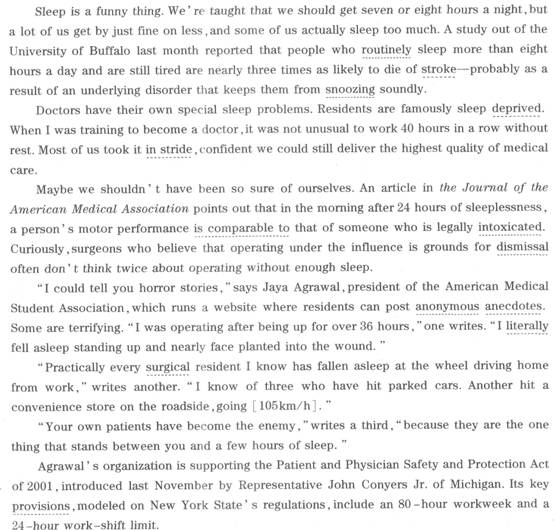

根据以上内容,回答6~10题。
Which of the following is NOT true according to the text?
[A] In a recent scientific research, the scientists points out that someone who sleeps
beyond the limit will probably not be in good health.
[B] In the United States, the doctors usually do not take their sleep problems seriously.
[C] Most doctors agree that the problems should be solved only by way of some compulsory means.
[D] The U. S. government has already restricted the doctors' working hours.
-
According to Peter Ricchiuti, New Orle
- ans [A] is often struck
- by hurri
- canes such as Katrina, [B] no longer pai
- d white collars as much as before. [C] failed to recover from the storm as planned. [D] will lose more while-collar jobs in oil industry after the storm.
-
According to Wilson, Chevron intends to tr
- ansfer its employees chiefly to [A] find a safer place for
- both business and living. [B] prote
- ct the company from other possible storms. [C] maintain the number of their employees. [
- D]downtown New Orleans is no longer a business center.
-
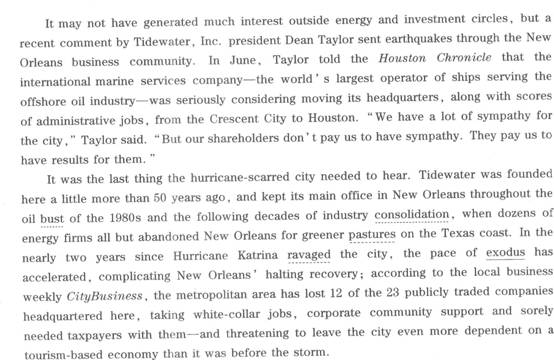
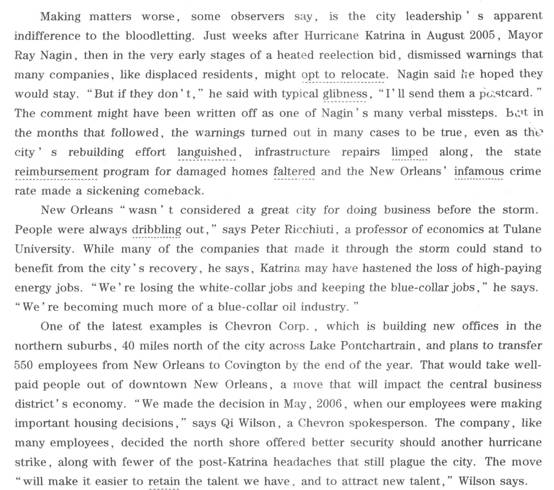
根据以上内容,回答1~5题。
It can be inferred from the first paragraph that
[A] Dean Taylor is also famous outside energy and investment circles.
[B] shareholders are not paid to have sympathy.
[C] many companies are planning to move their offices into New Orleans.
[D] shareholders are more concerned with performance.
-
M
- ayor Ray Nagin is quoted in the 3rd paragraph to [A] stress the consequences of careless talking
- by politi
- cians. [B] show the local government' s in
- difference to the exodus. [C] illustrate the city' s efforts in rebuilding their infrastructure. [D] criticize his strange hobby of sending postcards to companies.
-
The word "exodus" ( p
- aragraph 2 ) most pro
- bably means [A] emigration. [B] exit. [
- C] hurricane. [
- D] reconstruction.
-
__________
[
- A] serious&n
- bsp; [B]severe [
- C] grave [
- D] heavy
-
__________
[
- A] student&n
- bsp; [B] man [
- C] youth [
- D] peer
-
__________
[
- A] even though&n
- bsp; [B] as if [
- C] as long as [
- D] as soon as
-
__________
[
- A] specially&n
- bsp; [B] parti
- cularly [C] mostly [
- D] actually
-
__________
[
- A] in&n
- bsp; [B] to [
- C] since [
- D] for
-
__________
[
- A]murder&n
- bsp; [B]
- crime [C] suici
- de [D] killing
-
__________
[
- A] su
- bstitute [B] repla
- cement [C] exchange [
- D] interchange
-
__________
[
- A] enlarged [
- B]
- confirme
- d [C] exaggerated [D] magnified
-
__________
[
- A] overtake&n
- bsp; [B] overdose [
- C] abuse [
- D] overuse
-
__________
[
- A] valid&n
- bsp; [B] formal [
- C] popular [
- D] legal
-
__________
[
- A] When&n
- bsp; [B] As [
- C] Though [
- D] While
-
__________
[
- A] stimulus&n
- bsp; [B] stimulant [
- C] excitement [
- D] encouragement
-
__________
[
- A] treat&n
- bsp; [B]
- cure [C]
- diagnose [D] test
-
__________
[
- A] amusing&n
- bsp; [B]relaxing [
- C] recreational [
- D] pleasant
-
__________
[
- A] retaining&n
- bsp; [B] attaining [
- C] maintaining [
- D] gaining
-
__________
[
- A] descri
- bed [B] pres
- cribe
- d [C] inscribed [D] instructed
-
__________
[
- A] studies&n
- bsp; [B] resear
- ches [C] surveys [
- D] examines
-
__________
[
- A] tastes&n
- bsp; [B] smokes [
- C] injects [
- D] takes
-
__________
[
- A] More&n
- bsp; [B] Many [
- C] Fewer [
- D] Few
-
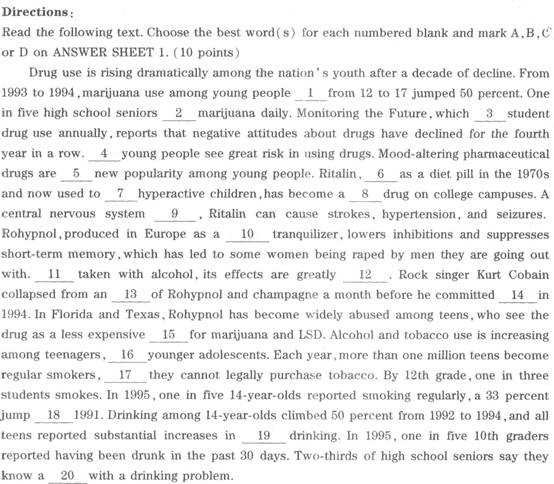
根据以上内容,回答1~20题。
__________
[A] aged
[B] aging
[C] age
[D] ages











